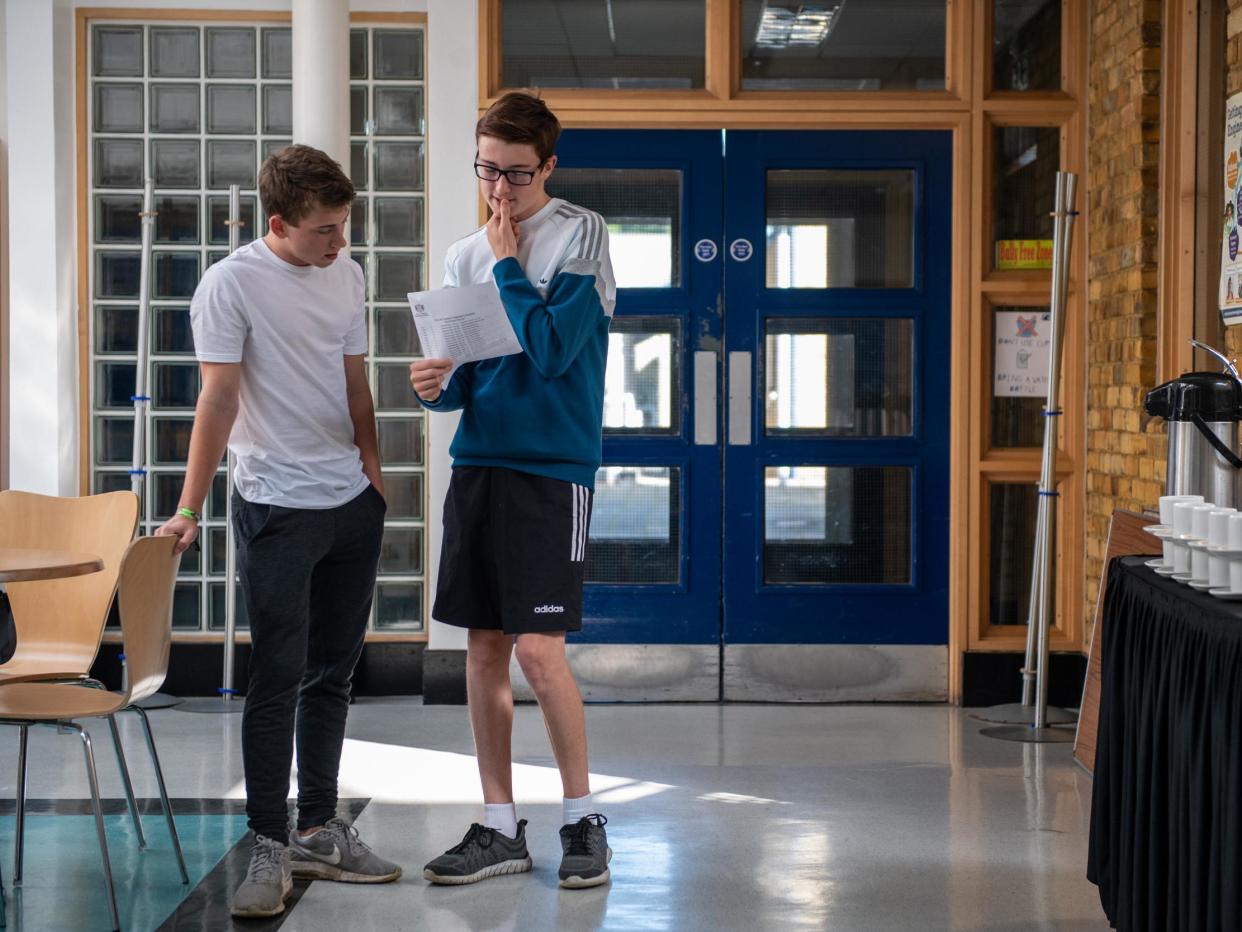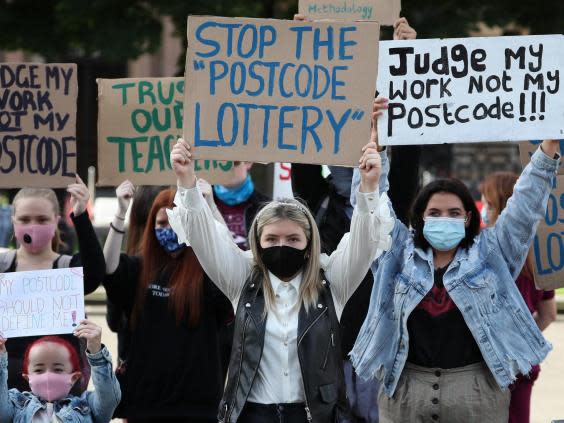Keep moderation for grades, headteachers and teachers in England say ahead of A-level and GCSE results day

Headteachers and teachers have told The Independent they hope England keeps moderation for grades in light of Scotland’s U-turn affecting tens of thousands of results.
Students in England are expecting to get their A-level results back on Thursday, with GCSE students finding out their marks the week after.
Results have already come out over the border, stoking controversy when it emerged more than 124,000 teacher estimated grades had been lowered in moderation.
The Scottish education secretary said on Tuesday this would no longer be the case, and these grades would go back to the teacher estimates.
However, headteachers have told The Independent they hope England does not follow suit after its own results day.
“We need to give our students confidence that the grades that have been standardised, are moderated, and that they are a true reflection of their ability,” Pepe Di’Iasio, a headteacher in Rotherham, said
“What we shouldn’t do is give any sense of uncertainty right now that provokes the storm has taken place in Scotland,” he told The Independent.
The Wales High School headteacher said he wanted children to ”feel like they’ve got the results of which they are capable and the results which are fair and reasonable for them”.
“What we don’t want is people being able to say, or naysayers saying in a year’s time or even on the day, they got that result but they didn’t deserve it or it was harder in my day,” the secondary schools headteacher said. “That is the bit that worries me most.”
Andy Byers, a headteacher in Durham, said he also thought there had to be some standardisation of grades.
“It’s not a criticism of teachers to say there is going to be some downgrading,” he says, “because teachers do not have all the information available.”
“An A* grade to one teacher may be different for a teacher in a different school,” the Framwellgate School Durham headteacher said, also adding: “There has to be some element of comparison between previous years.”
Many children were affected in Scotland when more than 124,000 grades were lowered in moderation — a decision that has now been reversed.
Some unions have called on England to follow Scotland’s lead and scrap moderated exam grades.
The cancellation of Scottish exams due to the coronavirus pandemic had led to a new grading system being put in place, with teachers’ grade estimates for pupils being moderated by the Scottish Qualifications Authority (SQA).
This was based on criteria including the past performance of schools and resulted in the pass rate for Higher pupils from the most deprived areas of Scotland being reduced by a greater percentage than those from the most affluent parts of the country.
“In these unprecedented circumstances, the UK government should follow the lead of Scotland by scrapping moderated grades,” Larissa Kennedy, president of the National Union of Students (NUS), said.
“This temporary measure must be taken to avoid a situation in which thousands of students do not receive the grades they deserve because of where they live.”
Current plans for grading in England means school submit what grades they believe children would have got in exams, which have been cancelled due to coronavirus.
These have been moderated by exams boards to make sure this year’s results are not significantly higher than previous years and the value of students’ grades are not undermined.
As part of the standardisation process, exam boards have also taken into account historical performance data to determine the proportion of students who achieved each grade in previous years. Schools will be able to appeal grades if they feel they have been unfairly affected by previous cohorts not “representative” of the current year.
Individual grades may have been adjusted upwards or downwards after moderation.
Caroline*, a teacher in Hampshire, tells The Independent she thinks this moderation of grades estimated by schools is necessary.
“Teachers predictions are inherently incorrect every year, because predictions are obviously based on what the teacher thinks the child is going to get,” she says. “But every year the grades are decided on based on a bell curve.”
She added: “You might think that you’ve got one student who’s going to get a four, which is now a pass, because you think they’re as good as a kid the year before who got a four.”
However, in reality, children may have improved nationally, putting grade boundaries up, Caroline added.
The Hampshire teacher says she also worries some schools may keep inflated grades if there is no moderation down.

As a result of the changes in Scotland, the new Higher pass rate for 2020 is 89.2 per cent, 14.4 per cent higher than the previous year.
The National 5 pass rate has also increased by 10.7 per cent to 88.9 per cent, as well as the Advanced Higher pass rate rising to 93.1 per cent — a rise of 13.7 per cent.
Some students expressed a sigh of relief as tens of thousands of grades went up, after the government announced more than 124,000 results that had been lowered as part of the moderation process would go back to the original teacher grade.
Backlash had followed Scottish results day, with calls for the education secretary to resign and student protests over how final grades were reached.
John Swinney, Scotland’s education secretary, said the backlash from angry pupils and parents at the methodology that disproportionately affected pupils from deprived backgrounds “outweighed” the Scottish government’s desire to suppress grade inflation.
The Scottish government said they would not comment on concerns over English exam results. The Department for Education have been approached for comment by The Independent.
*Not her real name as she spoke without employer’s consent
Additional reporting by Press Association
Read more
Pass rates rise in Scotland after students’ exam-free year
Pubs may have to close to keep schools open in local lockdowns
Algorithm ‘will punish pupils from struggling areas with lower grades’

